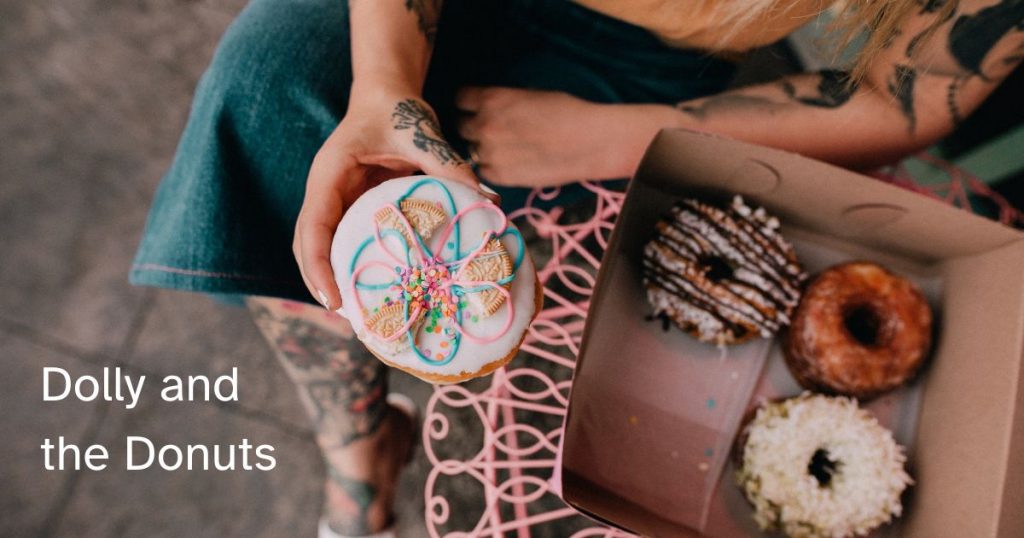
I was in graduate school at USC. Year one was over. I needed to work a full- time summer job, not just the part-time one I had in L.A. I got a job in a Casino dealing 21 in my old neighborhood in Reno, and fortunately, David and Dolly, friends who lived there, offered me to stay with them that summer.
Within days, I noticed that David, a 6’ foot guy who dressed in worn jeans, boots, and a plaid shirt, loudly nagged Dolly on a daily basis to lose weight. Dolly was a 5’2”, plump red-head, with a gentle heart.
I, also guilty of too many pounds, suggested we go to Weight Watchers together. First week, Dolly lost five pounds to my two. Good start, but not noticeable. Second week, she lost another five pounds. Third week, after her triple win, at 15 pounds less, she was starting to look good. By the fourth week, her transformation was amazing. She put on some makeup, shed her granny dress, and we went out to lunch to celebrate, testing our newly learned skills at choosing the right foods.
The next morning, guess what happened…
David brought home donuts:
Irresistible fragrant donuts, with sugar and cinnamon, and chocolate. Lemon- filled donuts, raspberry- filled donuts. I love donuts. If I eat one, I will eat six. Dolly shared my passion. The fragrant smell got to us. We dove in. She more enthusiastically than I. It didn’t take long till she was right back where we started.
I tucked that memory away, and slowly, as time went by and I, now graduated, worked with couples, saw the same behavior as David’s pop up on a regular basis. It looked something like this: nag, bully, intimidate the partner to change. When the partner finally starts to change, guess what? The nagger can’t handle it. That was perplexing to me at first. But it’s not really difficult to understand. After all, the dynamics between the two had shifted. Just like with David and Dolly. David knew how to handle Dolly. Overweight, she had lost a lot of her self-esteem, and gradually had settled into the role as a giving mother and wife. She dressed in a baggy grandma dress, no make-up, barely combed her hair. Cleaned her house, cooked the meals, dealt with the children, helped at Church. A model 50s housewife. But the 50s were long past. Thinner, she had more energy; she looked better, younger. She had changed out of her grandma dress, put on some makeup, combed her hair. Overweight she was no threat to David. She was compliant, lacking pride in herself. David didn’t need to worry that another guy might look at her. He was free to nag at her without fear of objection. David was threatened. The donuts were his weapon of “change-back-to-what-you-were so I can control you… So I can control my own insecurity.”
I was stunned. And I did what I do when I observe life. I tucked the memory away in my brain for a later date. When I saw the pattern emerge over and again, with other couples, I understood that our desire for change also brings up fear that comes with that change. We who want the change, find ourselves unsettled with the new set of behaviors. We no longer know what to do, we no longer know how to feel secure in the situation. And so we need to undo the very change we have set out to get.
This happens over and over, not just in couples, but in our own individual lives as well. As much as we are distressed by some circumstances, we don’t realize that we have adjusted to the very circumstances we don’t like, we have adapted to them, and change rocks that boat that has settled itself on bumpy, if not quite stormy, waters.
Looking back, both David and Dolly didn’t know how to handle the change. He bought the donuts; she gobbled them up.
Awareness of these dynamics are a major first step to change. Change takes time, but we adapt. Just think about the Pandemic. All of us were anxious, fearful, didn’t know what to do, didn’t know how to navigate life. And then we adjusted. Some more; some less. The Pandemic finally lifted enough, and many of us expressed reluctance to go back to our old way of doing things, including work, school, other interactive exchanges.
We see we are adaptable to circumstances. We can make changes. They are uncomfortable, often fearful, but in the end, we find a way. Survival depends on it. And life is about more than survival. It is about mutual love, companionship, growth…
Relationship changes take a while. We need to know that change is uncomfortable for us, even when it is seemingly, in the case of David and Dolly, for the better. And when we go with it, in the end, we grow from the experience. Even in the face of adversity, we adapt and grow. We improve our lives.
We really don’t need to bring home the donuts….
We don’t need to gobble them up.
